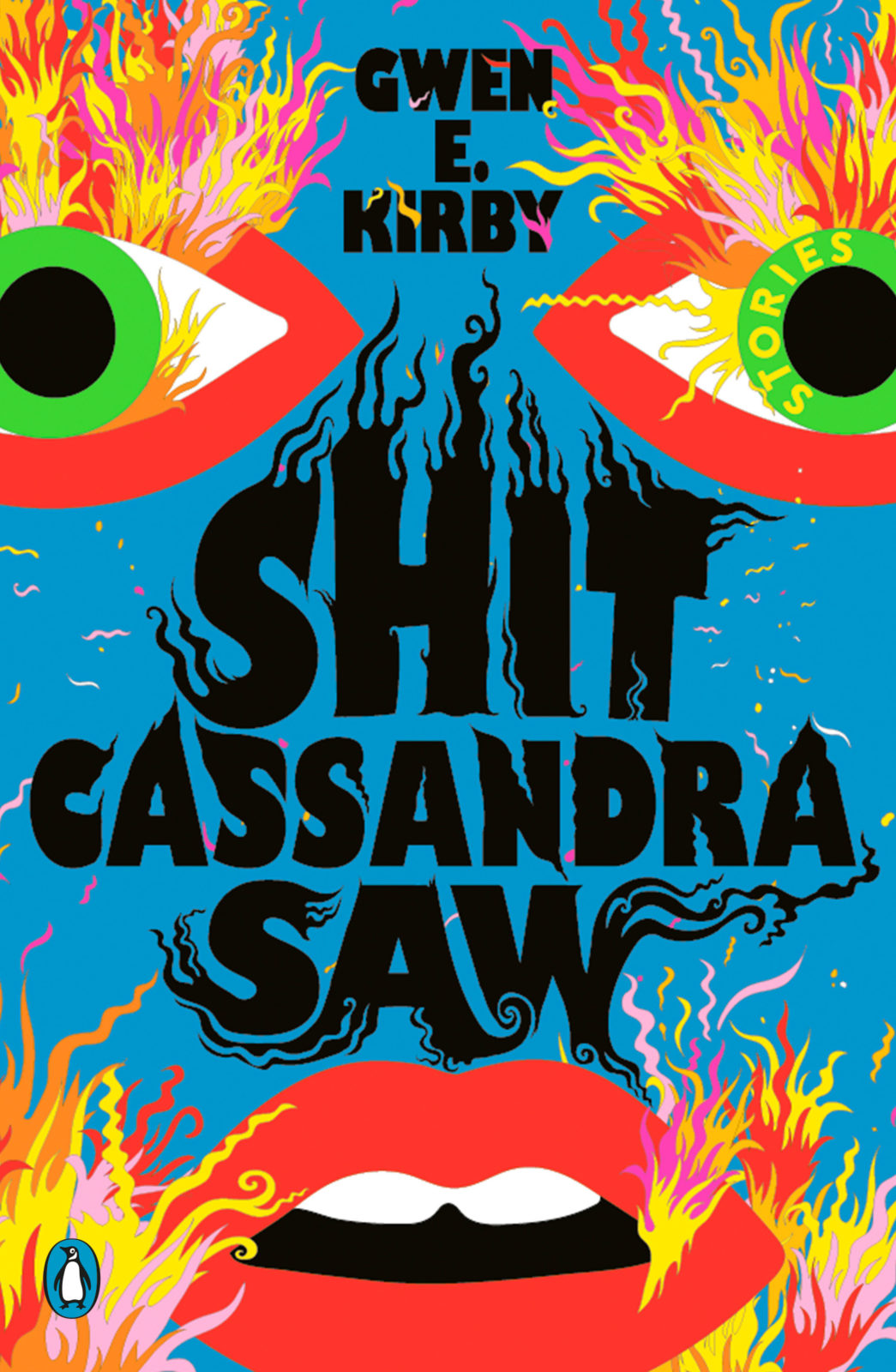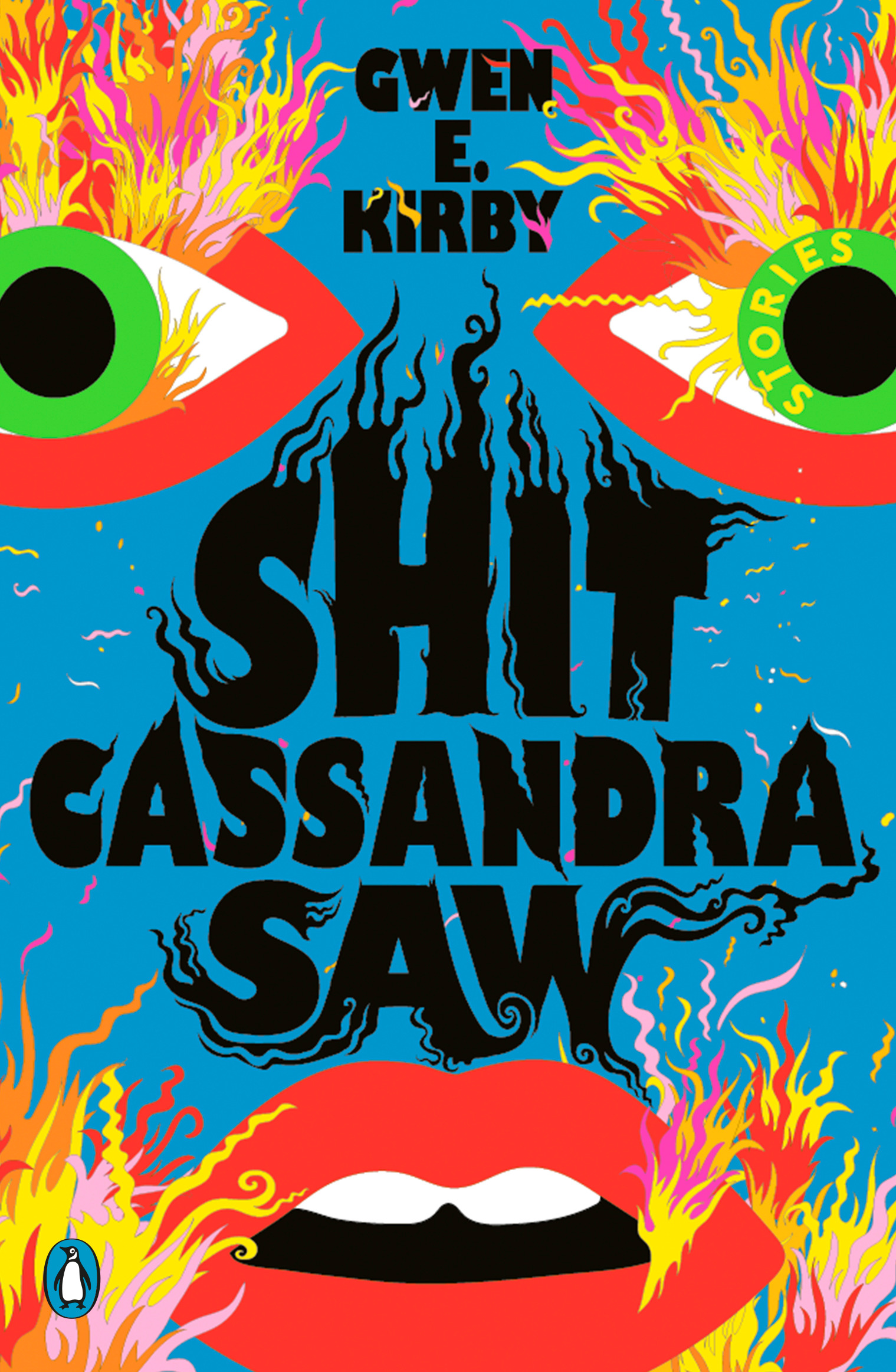
Gwen E. Kirby’s recent collection Shit Cassandra Saw (Penguin) is filled with lightning-bright characters in unexpected situations. The stories, which have won too many awards to list, span centuries, centering women in their challenges and triumphs. Gwen has a lot to say, and she does so with elegance and wit. Thanks to Gwen for taking time out of her schedule to answer my questions.
—Myna Chang
Myna Chang: Tell us about your collection. How did you approach your central themes? What emotions do you hope these stories will bring to your readers?
Gwen E. Kirby: Shit Cassandra Saw is a short story collection that focuses primarily on the experiences of women across the centuries, from Cassandra in Troy to a Welsh witch in the 1500s to contemporary teenagers at a summer camp. A central question that emerged as I wrote these stories was, what place do women have in the world, how do we find that place, and how do we break out of it? I wanted to write about being a woman without filtering myself, being angry when I wanted to be angry, sad when I wanted to be sad, horny or profane or elated, the full gamut of emotions. I hope first and foremost that my readers will be engaged, entertained, and that they’ll laugh! And I hope that they’ll find something in the stories that feels true to their experience of the world, that they connect to.
MC: Which story in the collection came first? Which is your favorite? Did that change over the course of writing?
Gwen: The first story I wrote that appears in the collection is “The Disneyland of Mexico,” which feels fitting in a way, as it is pretty autobiographical and I think my writing has, since then, steered away from such clear autobiography. Writing that story was a watershed moment for me as a writer because I knew I wanted to tell that story, of a girl coming of age while abroad, but I wasn’t getting it right until I experimented with writing the story in the second person. That clicked for me and you can see throughout the collection how often I play with point of view and with form. As for which is my favorite story, I don’t know! All of the stories have a soft spot in my heart, of course, but I guess a couple of my favorite favorites are “Here Preached His Last” and “First Woman Hanged for Witchcraft in Wales, 1594.”
MC: Which character did you most enjoy writing? Is there a character or scenario that particularly resonates for you?
Gwen: I loved writing all of these characters, but one in particular who jumps to mind is the whore from “The Best and Only Whore of Cwm Hyfryd, Patagonia, 1886.” I ended up admiring her so much and thinking a lot about what it means to survive and what it means to endure loss and still experience joy, even choose joy, because she works hard to frame her own life in a way that gives it meaning. It was a historical setting I was excited to write about but I didn’t anticipate how real it would end up feeling for me as I wrote, almost as if I was visiting her rather than inventing her.
MC: I loved “A Few Normal Things That Happen a Lot.” This is a complex story. Can you tell us how you developed these ideas? Why not give everyone a happy ending?
Gwen: Thank you! I began this story on the day of the Kavanaugh hearings and it is one of the few things I’ve ever written that began from a place of pure anger. At first I was mostly engaging in a cathartic exercise, imagining a world in which these moments of harassment and assault ended not in harm but in freedom from fear. As I wrote, though, of course those moments had to become more complicated. Violence feels freeing in the story at first—fangs, werewolves, lasers, etc.,—but it comes with a cost. Why should we need to be violent? Why should we need to wear armor? And how does that armor hurt us and keep us from being soft as well as fierce?
MC: Did you struggle with any of these stories? What was your biggest challenge?
Gwen: It would be much faster to answer what stories I didn’t struggle with! While a few came relatively quickly, most did not, and a few really tormented me. As one example, I had a terrible time writing “Here Preached His Last.” I was excited about the story from the jump and loved my judgmental ghost preacher and angry, stressed-out mother, but there were a lot of threads in that story that I wanted to get right: the relationship between mom and ghost, mom and child, mom and husband, mom and lover, mom and the soccer team she coaches. I wanted all of those relationships to feel fully realized and play off of one another without any one thread dominating too much. It took many many many drafts to get it where I wanted it and because of that, actually, it is one of the stories I am most proud of.
MC: I appreciated your use of humor throughout the collection. Is this typical for all your work?
Gwen: It is typical of my work because it’s typical of me! Humor, and often rather dark humor, is how I cope with life. When something bad happens and I’m telling a friend about it, I often try to make them and myself laugh. It is a form of deflection for sure sometimes, trying to keep the bad thing from seeming as bad as it is, but it is also a form of strength. Nothing feels as powerful as laughing at someone who wants to keep you down. And sometimes the world is simply delightfully absurd! I don’t sit down when I write and think, okay, time to be funny. But I do welcome moments of levity and of hilarious contradiction and when I find them, I try to lean in.
MC: Your success with Shit Cassandra Saw seems to be at odds with general assumptions about publishing—your debut book is a collection of short stories (not a novel) published by one of the major publishing houses. Do you think this is part of a trend? Do you foresee short story writers taking a bigger slice of the marketplace? Any advice for others with a strong group of short stories but no traditional novel manuscript?
Gwen: I was told for years as I worked on this book that short story collections were difficult to sell and that selling one without a novel would be nearly impossible. But since I didn’t have a novel and I did have a collection, well, I had to try! I don’t have any great advice for how to publish a short story collection except to say, have an agent who believes in the book and believes in it on its own merit. My agent from the start of our relationship (and I know this can be rare) believed that the collection (which at that point wasn’t nearly finished!) had the potential to sell. I have no idea if short story collections will begin to take a bigger slice of the marketplace; I still find the marketplace to be somewhat of a mystery! But I am in awe of the incredible collections that have come out just in the last few years and I hope that publishing reflects the really wonderful and innovative work that is happening now in the genre.
MC: How has the publishing experience been for you? Did the pandemic affect the production of your book? Were all your launch events virtual?
Gwen: The publishing experience has been excellent, if a bit surreal! It is amazing to have these stories out in the world and I have been so touched by people’s reaction to the book. I think my favorite thing about it has been that readers all have such different stories that speak to them and that has been really affirming. Like, yes, the book has a bazillion stories in it, but I swear, I worked hard on all of them! The pandemic definitely did affect the launch of the book and all of my events were unfortunately virtual, which did make the publication of the book feel a little less concrete. Sure, all these exciting things were happening, but I was still just sitting in my apartment, looking at a camera. I felt a bit cheated of my chance to give a reading at random bookstores, have only four people show up, and then share a plastic cup of cheap red wine with the bookseller, and I genuinely was looking forward to that, that chance to be a writer out in the world, meeting readers, and acquiring experiences and stories. Still, I can’t be anything but grateful for the book’s publication and for the really kind reception it’s gotten.
MC: What’s next for you?
Gwen: I am attempting to write that novel! It’s early days with that, so I won’t say more, just wish me luck! It’s exciting and very intimidating, both to start with a new form and to begin a new project when this one consumed so many years. I am also continuing to write short stories because it’s a form I’ve come to love and I don’t want to lose touch with the many wonderful forms and points of view that stories can offer. Stories have allowed me to be my absolutely weirdest self and I am so grateful for it.
***
GWEN E. KIRBY is the author of the debut collection Shit Cassandra Saw. She has an MFA from Johns Hopkins University and a PhD from the University of Cincinnati. Her stories appear in One Story, Tin House, Guernica, Mississippi Review, Ninth Letter, SmokeLong Quarterly, and elsewhere. Currently, she is the Associate Director of Programs and Finance for the Sewanee Writers’ Conference at the University of the South, where she also teaches creative writing.
Shit Cassandra Saw is available from Penguin Books wherever books are sold. Read more about Gwen’s work here, or find her on Twitter @gwenekirby.
***
MYNA CHANG (she/her) is the host of Electric Sheep SF. Her work has been selected for Flash Fiction America (W.W. Norton), Best Small Fictions, Best Indie Speculative Fiction, Daily Science Fiction, and MicroPodcast’s special science fiction edition. She has won the Lascaux Prize in Creative Nonfiction and the New Millennium Award in Flash Fiction. Connect with Myna on Twitter @MynaChang.
